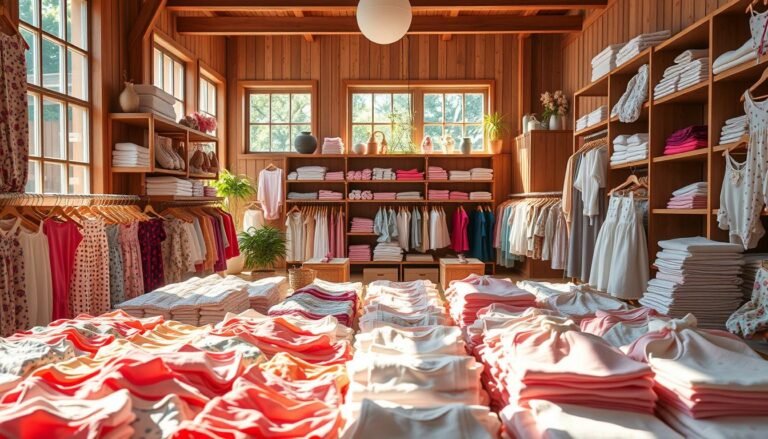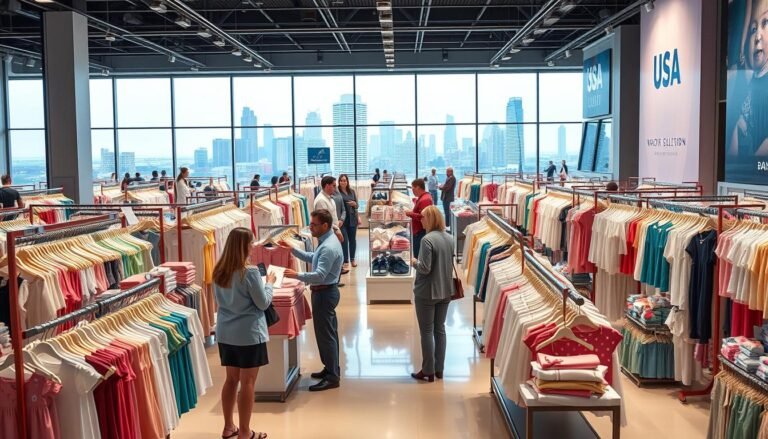Ever wondered what makes baby clothes comfy and long-lasting? It’s not just about cute designs. Parents should look at soft fabrics and secure fits. Brands like Little Hometown focus on these, plus easy diaper changes and clothes that grow with your baby. This mix ensures your baby feels great.
Are you a new parent or adding another child to your family? Knowing how to pick lasting baby clothes helps you and your baby. You’ll enjoy dressing your baby each day. This creates beautiful memories from simple moments.
Key Takeaways
- Choosing baby clothes involves more than aesthetics; comfort and safety are paramount.
- Brands like Little Hometown focus on soft fabrics and secure designs for infant well-being.
- Easy diaper changes and growth accommodation are crucial features in newborn apparel.
- Comfortable, durable clothing contributes to both parent and baby’s happiness.
- Dressing infants can turn ordinary moments into cherished memories.
Why Comfort and Durability Matter in Baby Clothes
When picking baby clothes, it’s not just about looks. It’s key to pick clothes that feel good and are safe for your baby. Baby skin is very sensitive. So, the fabric and how clothes are made really matter.
Delicate Baby Skin
Baby skin is super soft but easily gets irritated. That’s why it’s important to choose comfy baby clothes made of soft fabrics, like organic cotton or bamboo. Clothes that are kind to baby skin help avoid rashes and keep your baby feeling great.
Practicality for Parents
Dressing a baby can be tough. Practical baby outfits have easy snaps and stretchy designs. This makes getting dressed quicker. Durable clothes that can handle many washes are a must. They help deal with all the spills and stains that come with babies.
Long-Term Use
Buying durable baby wear means you save money over time. Clothes that last can be handed down. This is good for budgets and the planet. Outfits that grow with your baby give you more value for each piece.
Choosing the Right Fabric for Baby Clothes
Selecting the right fabric for baby clothes is very important. It ensures your little one stays comfortable and well. We’ll look at the benefits of organic baby clothing, bamboo baby clothes, and hypoallergenic infant wear.
Organic Cotton
Organic cotton is known for being soft and free of chemicals. It’s great for babies with sensitive skin. It’s grown without harmful pesticides, making it safe and gentle. Plus, it’s breathable, keeping your baby cool and comfy all day.
Bamboo Blends
Bamboo baby clothes are loved for their ability to wick moisture away. This fabric is super soft and helps keep the skin dry. This reduces skin irritation and discomfort. Bamboo blends are also sustainable, making them good for the planet.

Hypoallergenic Materials
For parents worried about allergies and skin reactions, hypoallergenic infant wear is a top choice. These materials lower the chance of allergic reactions. They keep your baby’s skin safe from irritants. This gives parents peace of mind.
The Importance of Size and Fit
It’s key to pick the right size and fit for baby clothes. This ensures your baby is comfy and can move easily. Brands may have different size standards.
Choosing a good fit lets your baby grow without feeling restricted.
Understanding Baby Sizes
Baby clothes are sized by age, like newborn or 0-3 months. But, sizes can vary a lot across brands. It’s important to look at size charts when you buy.
Also, babies grow at their own speed. Watching how your baby grows helps pick the best clothes.
Allowing Room for Growth
It’s smart to choose clothes that can adjust as your baby grows. Go for clothes with stretchy fabrics and adjustable features.
This way, clothes last longer, even through growth spurts. It also means less shopping for new sizes.

Shopping gets easier when you understand these tips. Here’s a size chart for different baby ages:
| Age Range | Weight (lbs) | Length (inches) |
|---|---|---|
| Newborn | 5-8 | 17-20 |
| 0-3 Months | 8-12 | 20-24 |
| 3-6 Months | 12-17 | 24-26 |
| 6-9 Months | 17-21 | 26-28 |
| 9-12 Months | 21-25 | 28-30 |
Remember these tips when you shop. They ensure your baby’s clothes fit well and are comfy.
Safety Considerations in Baby Apparel
Choosing baby clothes requires focusing on safety first. Parents must pick clothes that avoid any danger. This means clothes should stop choking threats and be flame resistant, protecting little ones.
Avoiding Choking Hazards
Baby clothes must not have small parts like buttons, beads, or bows. These can come off and be choking dangers. Clothes with secure snaps or zippers are better, keeping everything safely attached.
Ensuring Flame Resistance
Flame-resistant clothing is a must on a parent’s list. Such clothes have to meet safety standards. This keeps babies safe from fire accidents. Flame-resistant materials add security, protecting infants everywhere.

It’s vital parents look for flame-resistant labels in clothes. Be careful with used items as their resistance may wear down. Choosing clothes meeting safety rules keeps babies safe and gives parents comfort.
Practical Features to Look for in Baby Clothes
When picking out baby clothes, focus on those that make life easier. You should choose easy-use baby outfits designed for convenience and made of lasting fabrics. These clothes help make every day smoother.
Functional infant apparel often has easy-access snaps. This feature is great for fast diaper changes. It cuts down on the hassle, helping both parents and babies have a better time.

Durability matters a lot, too. Baby clothes need to hold up through many washes. Choose strong materials that keep their shape and color over time. This ensures the clothes last longer, saving money.
Also, clothes that serve multiple purposes stand out. They can go from play to nap time without changing outfits. For instance:
- Rompers that also work for sleeping.
- T-shirts with mittens attached for keeping hands warm.
- Pants with stretchy waistbands for comfort.
In short, the key to practical baby clothes is mixing ease with coziness. By focusing on these features, parents can dress their babies in clothes that fit right into their daily lives.
Dressing Your Baby for Different Seasons
As seasons change, we must think about dressing baby for weather to keep them comfy. We need clothes that are right for the season, look good, and work well. From light clothes in summer to warm layers in winter, choosing the right seasonal baby clothes is key.
Spring and Summer
In spring and summer, pick clothes that let skin breathe. Go for cotton and bamboo. These keep your baby cool. Versatile infant outfits like short-sleeved onesies and light rompers are great. Also, get sun-protective wear to protect against UV rays. On hot days, clothes that wick moisture away keep baby dry.
Fall and Winter
When it gets cold, layers are important. Choose soft wools and fleece for warmth without being too bulky. Seasonal baby clothes should have long sleeves, pants, and warm sweaters. Add layers like bodysuits, tights, and mittens to keep baby’s temperature just right. This way, your baby stays warm and happy outside in the cold.
Building a Functional Baby Wardrobe
Choosing the right clothes for your baby means picking items that are comfy, versatile, and right for any season. It’s about mixing everyday clothes with a few outfits for special times. This way, your baby will always look good and feel comfortable.
Everyday Essentials
For daily wear, your baby will need different bodysuits and onesies. Aim for 5-7 of them to start a good baby wardrobe essentials. Cotton stuff is best because it’s soft, breathes well, and is easy to clean. Also, have 5-7 pairs of pants or leggings. These can be mixed to make different outfits without much trouble.
Seasonal Items
Having clothes for both warm and cold weather is important. For cold times, keep 2-3 sweaters or jackets ready. Also, have 5-7 sleep sacks or pajamas in different materials to keep them warm. When the weather warms up, switch to lighter clothes like hats and thinner socks. Choosing materials like fleece for winter and linen for summer keeps your baby comfy all year.
Special Occasion Outfits
Aside from daily clothes, it’s nice to have some fancy outfits for special days. Think about getting 2-3 dressy items for your baby’s wardrobe. With these, your baby will be ready for family parties, holidays, or big moments looking stylish and cute.
Conclusion
Choosing baby clothes is all about finding the perfect mix of style, comfort, and practicality. This guide highlights the key things that matter in a baby’s wardrobe. It talks about choosing soft, safe fabrics like organic cotton and making sure everything is gentle for baby’s skin.
It’s very important to pick the right size and fit for baby clothes. Clothes should fit well but also let your baby grow. It’s key to avoid anything that could be a choking hazard and choose clothes that are safe.
Also, it’s smart to have clothes ready for every season. Having practical clothes makes daily life easier. In short, a good baby wardrobe supports a child’s early growth and happiness. By focusing on safety, the right fit, and useful features, parents can dress their newborns in a way that meets every need.



